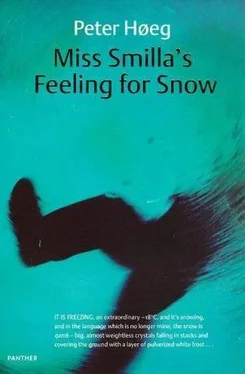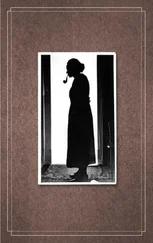Peter Høeg - Smilla's Sense of Snow aka Miss Smilla's Feeling for Snow
Здесь есть возможность читать онлайн «Peter Høeg - Smilla's Sense of Snow aka Miss Smilla's Feeling for Snow» весь текст электронной книги совершенно бесплатно (целиком полную версию без сокращений). В некоторых случаях можно слушать аудио, скачать через торрент в формате fb2 и присутствует краткое содержание. Жанр: Современная проза, на английском языке. Описание произведения, (предисловие) а так же отзывы посетителей доступны на портале библиотеки ЛибКат.
- Название:Smilla's Sense of Snow aka Miss Smilla's Feeling for Snow
- Автор:
- Жанр:
- Год:неизвестен
- ISBN:нет данных
- Рейтинг книги:3 / 5. Голосов: 1
-
Избранное:Добавить в избранное
- Отзывы:
-
Ваша оценка:
- 60
- 1
- 2
- 3
- 4
- 5
Smilla's Sense of Snow aka Miss Smilla's Feeling for Snow: краткое содержание, описание и аннотация
Предлагаем к чтению аннотацию, описание, краткое содержание или предисловие (зависит от того, что написал сам автор книги «Smilla's Sense of Snow aka Miss Smilla's Feeling for Snow»). Если вы не нашли необходимую информацию о книге — напишите в комментариях, мы постараемся отыскать её.
Smilla's Sense of Snow aka Miss Smilla's Feeling for Snow — читать онлайн бесплатно полную книгу (весь текст) целиком
Ниже представлен текст книги, разбитый по страницам. Система сохранения места последней прочитанной страницы, позволяет с удобством читать онлайн бесплатно книгу «Smilla's Sense of Snow aka Miss Smilla's Feeling for Snow», без необходимости каждый раз заново искать на чём Вы остановились. Поставьте закладку, и сможете в любой момент перейти на страницу, на которой закончили чтение.
Интервал:
Закладка:
This is not the first or the last time that I have had these thoughts. What is it that makes us seek out the plunge into depression?
As I close the report, I have an idea. I open it again and page through to the medical report. There I see something. And then I know that it's been worth all the trouble.
I've seen girlfriends in Greenland who, discovering that they're pregnant, suddenly take better care of themselves than ever before. That's the feeling that passes over me now. From now on I have to watch out for myself.
The traffic has stopped. I don't wear a watch, but it must be about 3:00 a.m. I switch off my flashlight.
The building is quiet. In the silence there is suddenly a sound that is wrong. It's too close to be coming from the street. But faint, like a whisper. From where I'm sitting, the doorway into the first small room is a faintly lit gray rectangle. One moment it's visible, the next it's not. Someone has stepped into the room, someone who is blocking the light with his body.
By moving my head slightly I can follow his movement along the shelves. I take off my boots. They're no good for running. I stand up. By moving my head slightly I can place the figure inside the faintly lit frame of the doorway.
We think there are limits to the dimensions of fear. Until we encounter the unknown. Then we can all feel boundless amounts of terror.
I take hold of one of the bookcases and topple it toward him. Just as it picks up speed, the first volumes fall out. That warns him, and he puts up his hands and tries to stop the bookcase. First it sounds like the bones of his forearms are snapping. Then what sounds like fifteen tons of books fall onto the floor. He can't let go of the bookcase. But it's resting very heavily on him. And slowly his legs begin to buckle.
The misconception that violence always favors the physically strong has spread to a large segment of the population. It's not correct. The results of a fight are a matter of speed in the first few yards. When I moved out to Skovgards School after six months at Rugmarkens School, I encountered for the first time the classic Danish persecution of those who are different. In the school we came from, we were all foreigners and in the same boat. In my new class I was the only one with black hair and broken Danish. There was one boy in particular, from one of the older classes, who was really quite brutal. I found out where he lived. Then I got up early and waited for him where he crossed Skovshoved Road. He was thirty pounds heavier than I was. He didn't have a chance. He never got the couple of minutes that he needed to work himself into a trance. I hit him right in the face and broke his nose. I kicked him on one kneecap and then on the other, to bring him down to a more acceptable height. It took twelve stitches to put his nasal septum back in place. No one ever really believed that it could have been me:
This time I don't stand there picking my nose either, waiting for Christmas to arrive. From the wall I grab one of the brass rods with fifty topographical maps attached and hit him as hard as I can on the back of the neck.
He drops at once. The bookcase comes down on top of him. I wait for a moment. To see whether he has any friends with him. Or a little dog. But there is no sound except his breathing from under thirty yards of bookcase.
I shine my flashlight on his face. A great deal of dust has settled on him. The blow has split the edge of one ear. He's wearing black sweatpants, a dark blue sweater, a black wool cap, dark blue deck shoes, and a guilty conscience. It's the mechanic.
"Clumsy Peter," I say. "What's the matter, did you trip?"
He can't answer because of the bookcase. I try to push it aside, but it won't budge.
I have to give up on professional precautions and turn on the light. I start in shoveling papers, books, folders, reports, and bookends made of solid steel away from the bookcase. I have to clear away nine feet. It takes fifteen minutes. Then I can lift it an inch, and he crawls out on his own. Over to the wall, where he sits down, feeling his skull.
Not until then do my legs start to shake.
"My vision is blurry," he says. "I think I have a c-concussion."
"We can always hope so," I say.
It takes fifteen minutes before he can stand up. And even then he's like Bambi on the ice. It takes another half hour to get the bookcase upright. We have to take off all the papers first before we can lift it and then put them all back. It gets so hot that I have to take off my skirt and work in my tights. He walks around barefoot and barechested and gets frequent hot flashes and dizzy spells and has to rest. Shock and unanswered questions hang in the air along with enough dust to fill a sandbox.
"It smells like fish in here, Smilla."
"Cod liver," I say. "It's supposed to be so healthy." He watches in silence as I open the electronic safe and hang the key in its place. Then we lock up after us. He leads me over to a gate in the fence facing Svaneke Street. It's open. After we go through, he bends over the lock and it clicks shut.
His car is parked on the next street. I have to support him with one hand. In the other I'm carrying a garbage bag full of other garbage bags. A patrol car passes us slowly, but without stopping. They see so much going on in the streets at this time of year. People should be allowed to amuse themselves in whatever manner they choose.
He tells me that he's trying to get his car accepted by a classic car museum. It's a '61 Morris 1000, he tells me. With red leather seats and wooden top and instrument panel.
"I can't drive," he says.
"I don't have a license."
"Have you ever driven before?"
"Snow-cats on the ice cap."
But he wasn't going to subject his Morris to that. So he drives. There's barely room for his large body behind the wheel. The top is full of holes and we're freezing. I wish that he had succeeded in getting it into a museum a long time ago.
The temperature has fallen from just below freezing to hard frost, and on our way home it starts to snow. With qanik, fine-grained powder snow.
The most dangerous kind of avalanches are powder snow avalanches. They're set off by extremely small energy disturbances, such as a loud noise. They have a very small mass, but they move at 125 miles per hour, and they leave behind them a deadly vacuum. There are people who have had their lungs sucked out of their bodies by powder snow avalanches.
In miniature form, these are the kind of avalanche that started on the steep, slippery roof that Isaiah fell from and which I now force myself to look up at. One of the things you can learn from snow is the way great forces and catastrophes can always be found in miniature form in daily life. Not one day of my adult life has passed that I haven't been amazed at how poorly Danes and Greenlanders understand each other. It's worse for Greenlanders, of course. It's not healthy for the tightrope walker to be misunderstood by the person who's holding the rope. And in this century the Inuit's life has been a tightrope dance on a cord fastened on one end to the world's least hospitable land with the world's most severe and fluctuating climate, and fastened on the other end to the Danish colonial administration.
That's the big picture. The little everyday picture is that t have lived on the floor above the mechanic for a year and a half, have spoken to him countless times, and he has fixed my doorbell and repaired my bicycle, and I have helped him check a letter to the housing authorities for spelling mistakes. There were about twenty misspelled words out of a total of twenty-eight. He's dyslexic.
We ought to take a shower and rinse off the dust and the blood and the cod liver. But we are bound together by what has happened. So we both go up to his apartment. Where I've never been before.
Читать дальшеИнтервал:
Закладка:
Похожие книги на «Smilla's Sense of Snow aka Miss Smilla's Feeling for Snow»
Представляем Вашему вниманию похожие книги на «Smilla's Sense of Snow aka Miss Smilla's Feeling for Snow» списком для выбора. Мы отобрали схожую по названию и смыслу литературу в надежде предоставить читателям больше вариантов отыскать новые, интересные, ещё непрочитанные произведения.
Обсуждение, отзывы о книге «Smilla's Sense of Snow aka Miss Smilla's Feeling for Snow» и просто собственные мнения читателей. Оставьте ваши комментарии, напишите, что Вы думаете о произведении, его смысле или главных героях. Укажите что конкретно понравилось, а что нет, и почему Вы так считаете.




![Рута Шепетис - Ashes in the Snow [aka Between Shades of Gray]](/books/414915/ruta-shepetis-ashes-in-the-snow-aka-between-shades-thumb.webp)







